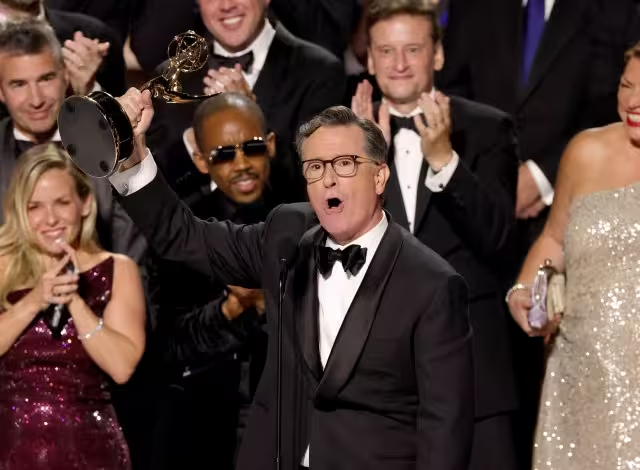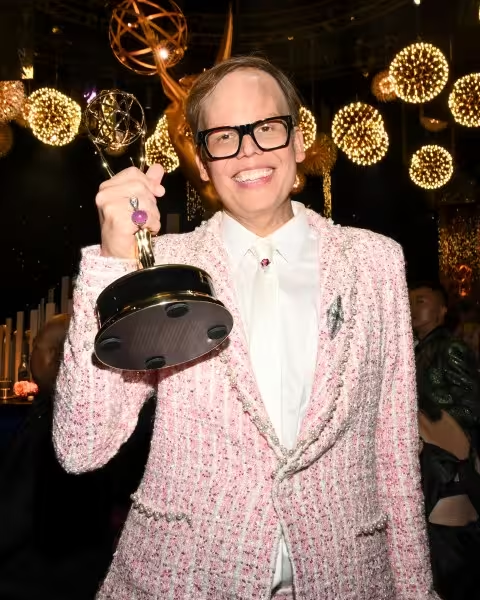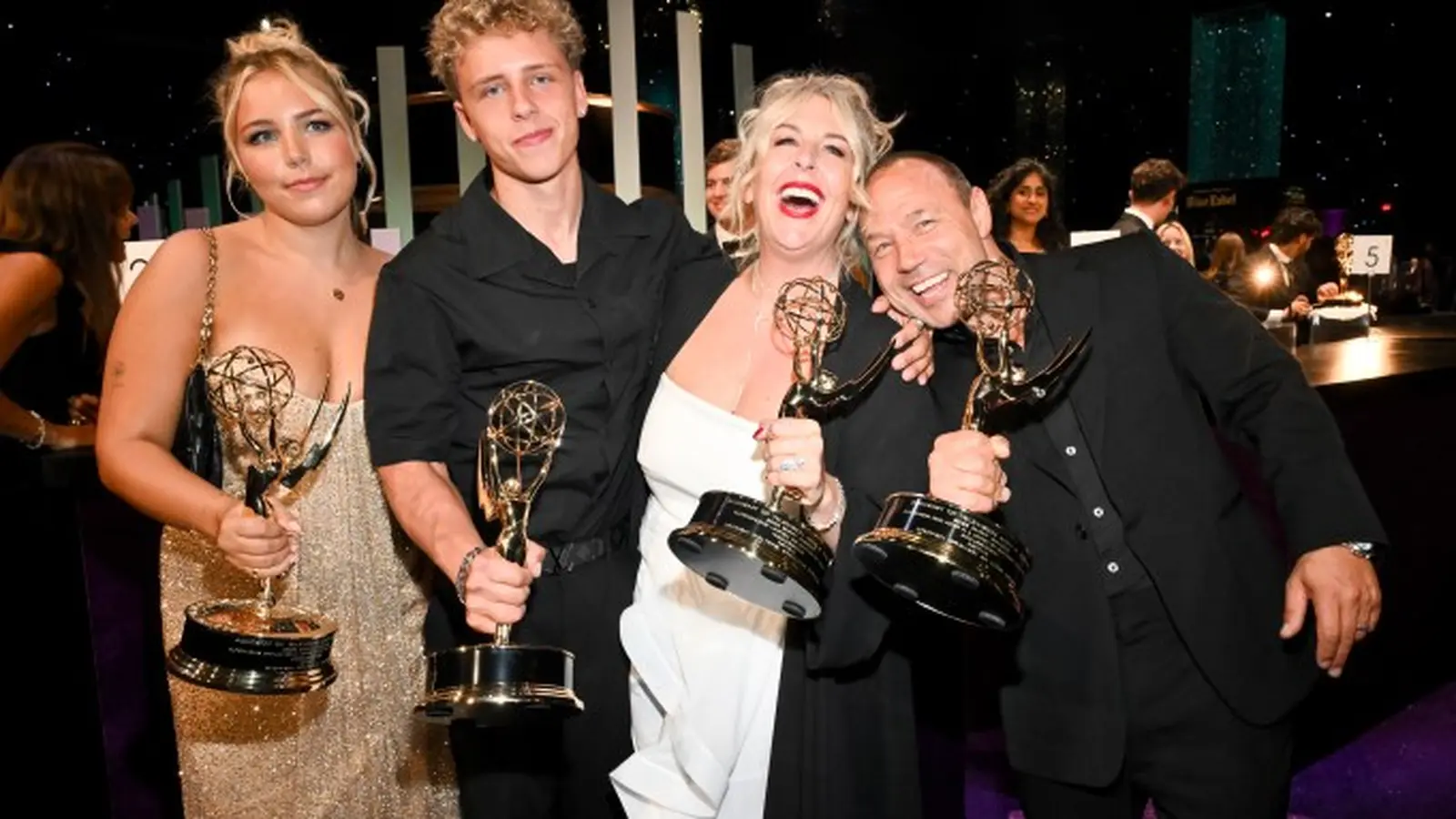10 Minutes
When Expectations Meet Surprise
The 77th Primetime Emmy Awards arrived with pundits predicting a night of familiar winners and safe choices. What the Television Academy delivered instead was a ceremony defined by firsts, breakout shows and the growing influence of streaming platforms. From Apple TV+'s comedy juggernaut to HBO's instant drama hit, Emmy night felt less like the predictable coronation of repeat champions and more like a celebration of risk-taking, new voices and the changing structure of prestige television.
Big Winners and the Rise of New Shows
Apple TV+'s freshman comedy, The Studio, dominated the comedy field, capturing Best Comedy Series and an unprecedented 13 Emmys in one season. Seth Rogen, as an executive force behind the show and a creative presence on-screen, collected four of those trophies — a sign of how star-driven creators can anchor awards campaigns in the streaming era. The Studio's sweep places it among the very few first-year shows to win big, joining a recent arc of newcomers that have taken the category by storm.

HBO matched that energy in drama. The Pitt, another first-season phenomenon, won Outstanding Drama Series. Noah Wyle, in a long-awaited win, took Lead Actor in a Drama — a career milestone long in the making — while Katherine LaNasa, Tramell Tillman and Brit Lower earned acting trophies for their supporting work. The influx of first-time winners signaled a willingness among voters to reward fresh creative visions rather than default to legacy programs.
What this says about awards trends
The Studio and The Pitt are not isolated cases. The last decade has seen the Comedy Series category tilt toward first-time winners: The Marvelous Mrs. Maisel, Fleabag, Schitt’s Creek, Ted Lasso, The Bear and Hacks all seized the crown as newcomers. This contrasts sharply with the era before 2018 when shows like 30 Rock, Veep and Modern Family dominated repeatedly. The shift hints at a broader appetite for novelty and a more fragmented, competitive television landscape where new voices—and new platforms—can break through quickly.

Streaming vs. Broadcast: Power Shifts and Ironies
The streaming giants were center stage. Netflix's Adolescence led the Limited Series pack and finished the night with eight Emmys, tying with HBO for the largest haul. Adolescence collected wins across the board: Stephen Graham won three awards for his work, Owen Cooper became the youngest Emmy winner in history, and Erin Doherty scored a major prize. Netflix’s consistent performance in Limited Series—following wins with The Queen’s Gambit, Beef and Baby Reindeer—underlines the streamer’s strategic focus on high-concept, event television that travels internationally.
In an ironic twist for legacy television, CBS — the network that aired the telecast — took home only one award that night: The Late Show With Stephen Colbert won Outstanding Talk Series. The victory was a first for Colbert’s program and for broadcast network talk shows since David Letterman’s last win in 2002. The moment carried extra weight because of Colbert’s recent cancellation by CBS: it was a rare example of a broadcast network canceling a franchise only to receive awards recognition later.

Industry context: Why streaming keeps winning
Streaming platforms benefit from global reach, large marketing budgets and the ability to back risky, auteur-driven projects. They can greenlight limited series that feel cinematic in scope and attract film talent who once exclusively pursued theatrical careers. That creative flexibility, combined with heavy awards campaigning and international viewership, gives streaming services a distinct advantage during Emmy season.
Surprises, Underdogs and Memorable Speeches
Some wins were the definition of underdog moments. Jeff Hiller’s victory for Supporting Actor in a Comedy for HBO’s Somebody Somewhere stunned many—he beat out established names such as Harrison Ford and Ike Barinholtz. Hiller’s success is a reminder that critical acclaim and an intimate connection with voters can outrun star power.

On the podium, the Academy Chair Cris Abrego delivered an unusually charged address. Abrego highlighted the Governors Award given at the Creative Arts ceremony to the Corporation for Public Broadcasting and spoke candidly about the consequences of its federal defunding. His speech, a call for continued diversity and inclusion at a fraught political moment, resonated across the room and drew praise at the Governors Ball. As the Academy’s first Latino chairman, Abrego’s remarks felt notably personal—an intersection of art, policy and advocacy rarely voiced from the stage with such directness.
Host Nate Bargatze also changed the tone of the evening with a structural innovation: he pledged $100,000 to the Boys & Girls Clubs of America up front and instituted a $1,000 penalty for acceptance speeches that ran more than 45 seconds over time. The gambit kept the show moving and added drama to the clock. In the end, CBS matched part of the donation and Bargatze personally topped it, creating a philanthropic headline that became one of the night’s most talked-about moments.
Behind the Scenes: Parties, Campaigns and the Business of Prestige
The awards night extends beyond the red carpet. Netflix’s post-Emmys party in Hollywood turned into a victory celebration as creatives and executives toasted Adolescence’s wins. Ted Sarandos and the platform’s awards team were visibly energized—Netflix’s strategy of investing in prestige miniseries continues to pay off.

Plan B's Jeremy Kleiner, already a two-time Oscar winner, now adds an Emmy to his producing credentials. His presence at the party, alongside Plan B’s first television president, Nina Wolarsky (a 2023 hire from Netflix), underscores a shift: major film producers are increasingly embedding themselves into long-form television. The result is a steady stream of cinematic series that blur the line between film and TV, attracting talent used to the film awards circuit.
Campaigning and the new rules of awards
Campaigning for Emmys has always mattered, but streaming platforms have sharpened the game with targeted screenings, global marketing and cultural conversation building. Whether it’s curated Q&As, social-first content or intimate screenings for voters, the awards season now resembles a multi-platform media campaign. But as Jeff Hiller’s win shows, grassroots enthusiasm and the right narrative can still topple heavyweight campaigns.
Comparisons and Cultural Impact
Comparing the 2025 Emmys to previous years reveals a tectonic industry shift. Where repeat winners once defined eras, the current landscape rewards bolder, singular seasons. The Studio’s comedic sensibility—raw, self-referential and media-savvy—echoes the cultural bite of shows like Fleabag but with a contemporary sheen and star power. The Pitt has the serialized seriousness of earlier prestige dramas like The Sopranos or Mad Men but wraps it in a modern, streaming-friendly format designed to hook global audiences quickly.
Culturally, these wins function as statements: that audiences and voters value novelty, that streaming platforms can still break through with risk-taking content, and that television continues to be the most dynamic medium for long-form storytelling. The Academy’s embrace of newcomers suggests an industry more willing to elevate fresh perspectives, which may translate into broader creative risks in the seasons to come.
Expert Take
"The 2025 Emmys felt like a reset—an acknowledgment that television’s future lies with bold, finite statements rather than endless seasons," says film critic Anna Kovacs. "We’re seeing cinematic talents migrate to limited series, and voters are rewarding that cross-pollination. The result is a richer awards field and, ultimately, better television for viewers."
Trivia and Noteworthy Firsts
- The Studio became the first comedy series to claim 13 Emmys in a single season.
- Owen Cooper set a new record as the youngest Emmy winner.
- Stephen Graham collected three Emmys in the Adolescence sweep.
- The Late Show With Stephen Colbert scored its first Emmy for Outstanding Talk Series despite its recent cancellation by CBS.
- Cris Abrego became the first Academy chairman whose speech about the CPB’s defunding drew widespread public attention at the Emmys.
Critical Perspectives
Not everyone hailed the evening as an unalloyed triumph. Some critics argue that awards still reflect industry politics and campaign clout as much as creative merit. Others noted an unevenness in representation among nominees, and raised questions about the Television Academy’s outreach beyond its traditional voter base. But even critics conceded the emotional highs—the underdog wins, the political speech and the palpable enthusiasm at the Netflix party—made the night distinctive.
What This Means for Creators and Viewers
For creators, the message is clear: take risks, tell bold stories and collaborate across film and television lines. For studios and streamers, invest in limited series and auteur-driven projects that can travel globally. For viewers, the renaissance of first-year winners suggests more varied and adventurous programming ahead.
Conclusion: An Emmys Moment That Looked Forward
The 77th Emmys were equal parts celebration and recalibration. Instead of repeating past patterns, the Television Academy used the platform to elevate new series, reward surprising performances and spotlight industry issues that matter. Whether you watched the broadcast, scrolled the winner lists or celebrated at an after-party, the evening signaled a turning point: television’s golden age is not a static plateau but a fast-moving frontier where first-time winners, streaming strategies and bold creative choices shape the story.
As audiences around the world stream the new winners, they’re not just consuming content—they’re witnessing how television reinvents itself. That reinvention promises more daring comedies, risk-taking dramas and limited series that feel cinematic in ambition. And who knows? Next year’s Emmys may bring another batch of unexpected firsts.
Source: deadline


Leave a Comment